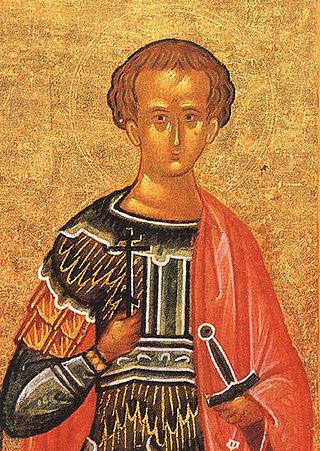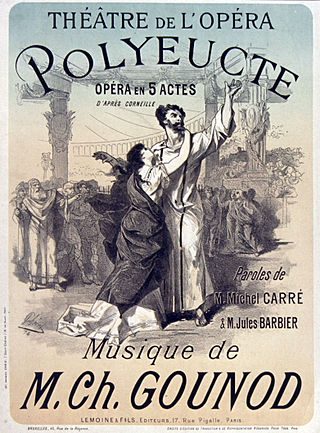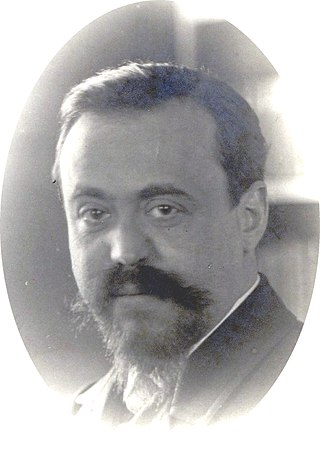
Paul Abraham Dukas was a French composer, critic, scholar and teacher. A studious man of retiring personality, he was intensely self-critical, having abandoned and destroyed many of his compositions. His best-known work is the orchestral piece The Sorcerer's Apprentice, the fame of which has eclipsed that of his other surviving works. Among these are the opera Ariane et Barbe-bleue, his Symphony in C and Piano Sonata in E-flat minor, the Variations, Interlude and Finale on a Theme by Rameau, and a ballet, La Péri.

The Year 1812, Solemn Overture, Op. 49, popularly known as the 1812 Overture, is a concert overture in E♭ major written in 1880 by Russian composer Pyotr Ilyich Tchaikovsky. The piece commemorates Russia's successful defense of the French invasion of the country by Napoleon in 1812.

The William Tell Overture is the overture to the opera William Tell, whose music was composed by Gioachino Rossini. William Tell premiered in 1829 and was the last of Rossini's 39 operas, after which he went into semi-retirement. The overture is in four parts, each following without pause.

Polyeucte is a drama in five acts by French writer Pierre Corneille. It was finished in December 1642 and debuted in October 1643. It is based on the life of the martyr Saint Polyeuctus (Polyeucte).

Russian Easter Festival Overture: Overture on Liturgical Themes, Op. 36, also known as the Great Russian Easter Overture, is a concert overture written by the Russian composer Nikolai Rimsky-Korsakov between August 1887 and April 1888. It was dedicated to the memories of Modest Mussorgsky and Alexander Borodin, two members of the group of composers known in English as "The Five". It is the last of what many call his three most exceptionally brilliant orchestral works, preceded by Capriccio Espagnol and Scheherazade. The work received its premiere at a Russian symphony concert in St. Petersburg on 15 December [O.S. 3 December] 1888.
On two occasions, Felix Mendelssohn composed music for William Shakespeare's play A Midsummer Night's Dream. First in 1826, near the start of his career, he wrote a concert overture. Later, in 1842, five years before his death, he wrote incidental music for a production of the play, into which he incorporated the existing overture. The incidental music includes the famous "Wedding March".
The Hebrides is a concert overture that was composed by Felix Mendelssohn in 1830, revised in 1832, and published the next year as Mendelssohn's Op. 26. Some consider it an early tone poem.

The Faust Overture is a concert overture by German composer Richard Wagner. Originally composed between 1839 and 1840, Wagner intended it to be the first movement of a Faust Symphony based on the Faust legend and play by German playwright Johann Wolfgang von Goethe. Eventually, Wagner abandoned writing the planned symphony and composed instead a single-movement concert overture, incorporating ideas from the other sketched movements. He made a final revision to the score in 1855. The Faust Overture is one of the few compositions by Wagner which was written for the concert hall, rather than the theatre.
The Festive Overture, Op. 96 is an orchestral work composed by Dmitri Shostakovich in 1954. Commissioned for the Bolshoi Theatre's celebration of the 37th anniversary of the October Revolution, the score has since become one of the most enduring of Shostakovich's occasional scores.

Paul Jules Barbier was a French poet, writer and opera librettist who often wrote in collaboration with Michel Carré. He was a noted Parisian bon vivant and man of letters.

Saint Polyeuctusof Melitene was an ancient Roman saint. Christian tradition states that he was a wealthy Roman army officer who was the first martyr in Melitene, Armenia, under Valerian.

Les martyrs is a four-act grand opera by Gaetano Donizetti set to a French libretto by Eugène Scribe. The libretto was based on one written by Salvadore Cammarano for an original Italian version known as Poliuto, which was not performed until after the composer's death. Pierre Corneille's play Polyeucte written in 1641–42, the story of which reflected the life of the early Christian martyr Saint Polyeuctus, is the original source for both versions.

Polyeucte is an opera in five acts by Charles Gounod. The libretto was by Jules Barbier and Michel Carré, after the play of the same name (1643) by Pierre Corneille, about Saint Polyeuctus, an early Roman martyr in Armenia. Originally intended for the Salle Le Peletier in Paris, the premiere was delayed when that theatre was destroyed by fire in October 1873. The work eventually premiered in the new Palais Garnier on 7 October 1878.
Shakespeare's Hamlet was the inspiration for two works by Pyotr Ilyich Tchaikovsky: the overture-fantasia Hamlet, Op. 67, and incidental music for the play, Op. 67a.

The Sorcerer's Apprentice is a symphonic poem by the French composer Paul Dukas, completed in 1897. Subtitled "Scherzo after a ballad by Goethe", the piece was based on Johann Wolfgang von Goethe's 1797 poem of the same name. By far the most performed and recorded of Dukas' works, its notable appearance in the Walt Disney 1940 animated film Fantasia has led to the piece becoming widely known to audiences outside the classical concert hall. Its first performance was given in Paris on May 18, 1897, by the Societe Nationale de Musique. The composer himself was its conductor. Its score was first published in 1897 by A. Durand & Fils.)

Tavistock House was the London home of the noted British author Charles Dickens and his family from 1851 to 1860. At Tavistock House Dickens wrote Bleak House, Hard Times, Little Dorrit and A Tale of Two Cities. He also put on amateur theatricals there which are described in John Forster's Life of Charles Dickens. Later, it was the home of William and Georgina Weldon, whose lodger was the French composer Charles Gounod, who composed part of his opera Polyeucte at the house.

Dilaver Duka is an American professional soccer player who plays as a midfielder for FC Motown in the National Premier Soccer League.
Les Siècles is a French symphony orchestra founded in 2003 by François-Xavier Roth, with ambition to put works from the 17th to 21st centuries into today's perspective. The musicians of the orchestra play each repertoire on the historical instruments appropriate to the time of its creation.
Polyeucte drama by Pierre Corneille
Leon Klepper was a Romanian composer of classical music.












